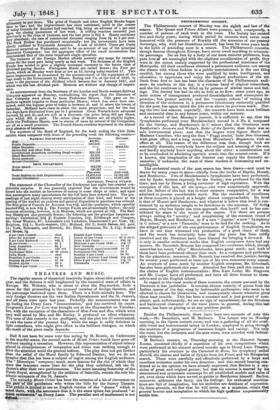Besides the Philharmonic, there have been two concerts of note
this week,—Mr. BenedicCs, and M. Berlioz's. The former was on Monday morning, in the Opera concert-room; and was a gathering of all the avail- able vocal and instrumental talent in London, employed in going through the contents of a programme of immense length and variety. Not only the room, but the orchestra and the ante-room, were crowded with fashion- able visitants.
M. Berlioz's concert, on Thursday morning, at the Hanover Square Rooms, consisted chiefly of a repetition of his own compositions which were performed at his concert several months ago in Drury Lane Theatre; particularly his overture to the Carnaval de Rome, his symphony called Harold, the chorus and ballet of Sylphs from his Faust, and Ids Hungarian march. These were carefully and effectively performed by a large and excellent orchestra under his own direction: and this second hearing con- firmed us in the opinion we have already expressed, that Berlioz is a mu- sician of great and original genius; but that his success is marred by his determined and systematic contempt for all established models and rules of art, even those which have served as guides to Beethoven himself. Berlioz, moreover, addresses the fancy, not the feelings: his orchestral combina- tions are full of imagination, but his melodies are destitute ef expression. On these grounds, we fear that he will never, as a musician, obtain that general honour and acceptation to which his high qualities unquestionably entitle him.


























 Previous page
Previous page